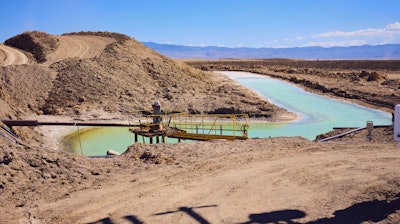
RENO, Nev. (AP) — Two tribes that joined a legal battle over plans to build a mine at the largest known U.S. deposit of lithium urged a judge Thursday to temporarily ban digging for an archaeological survey that they say would desecrate sacred tribal lands in Nevada near the Oregon line.
The Reno-Sparks Indian Colony and Atsa Koodakuh Wyh Nuwu/People of Red Mountain are intervening in a lawsuit that four conservation groups have filed against Lithium Nevada Corp. The tribes say their ancestors were massacred in the late 1800s at the proposed Thacker Pass site that would mine lithium, a key component in electric vehicle batteries. Demand for the mineral is expected to triple over the next five years.
The tribes say the Bureau of Land Management’s approval of the project in December during the final weeks of the Trump administration violates the National Historic Preservation Act because they haven’t been consulted about potential efforts to mitigate damage to their sacred lands.
Building a mine “where our ancestors were massacred — where our ancestors’ bones, blood and flesh form a part of the soil — would be like building a lithium mine over Pearl Harbor, Arlington National Cemetery or the Gettysburg Battlefield,” according to an affidavit that lawyers for the tribes filed Thursday in federal court in Reno with a request to temporarily block the digging.
The Paiutes call Thacker Pass “Pee hee mu’huh,” which means “rotten moon.” Tribal leaders with the Reno-Sparks Indian Colony describe in oral histories how Paiute hunters returned home to find the “elders, women, and children murdered, unburied and rotting with their intestines spread across the sagebrush in this pass shaped like a crescent moon.”
The tribes’ request comes after U.S. District Judge Miranda Du rejected a motion last week from conservationists who sought to block the digging based on claims that it would destroy critical habitat for the sage grouse, an imperiled ground-dwelling bird.
She said during a July 21 hearing on the conservationists’ request that the tribes had a better chance of persuading her to temporarily halt activity at the mine site.
“The argument about irreparable harm is more persuasive — the violation of the National Historic Preservation Act itself,” she said.
Du has ordered the company and the land agency, which is overseen by the Interior Department, to respond to the tribes' motion by Aug. 12 and has scheduled a hearing later that month.
Lithium Nevada had intended to begin digging trenches this week to gather samples for the survey across about a quarter of an acre.
But government lawyers told the judge last week that some necessary permits were still pending. They agreed to notify Du if they wanted to start digging before Aug. 23 so she could consider an emergency order. She said she doesn’t intend to rule on the merits of the overall case before January.
The Bureau of Land Management says it has been consulting with the three federally recognized tribes at Thacker Pass — the Fort McDermitt Paiute and Shoshone tribes and Winnemucca Indian Colony — about plans on how to treat historic properties.
The agency said it didn’t object to the two other tribes intervening, but Lithium Nevada said it did, partly because it argued Atsa Koodakuh Wyh Nuwu/People of Red Mountain isn’t a tribe defined under the National Historic Preservation Act.
The company said a review has included “substantial consultation” with local tribes that never raised similar concerns, while it spent $10 million on the permitting process for the mine.
Tribal lawyers said in Thursday’s filing that the government also should be consulting with at least nine other tribes in Nevada, California and Oregon with ties to Thacker Pass.
Michon Eben, the Reno-Sparks Indian Colony’s tribal historic preservation officer, said she told federal officials last month that “just because regional tribes have been isolated and forced onto reservations relatively far away from Thacker Pass does not mean these regional tribes do not possess cultural connections to the pass.”
Darranda Hinkey, a Paiute-Shoshone member who serves as secretary of the People of Red Mountain, said the Fort McDermitt tribe “might not exist if not” for the caves and rock outcrops at Thacker Pass where their ancestors hid from American soldiers who were rounding them up “at the point of a gun to force them onto reservations.”






















